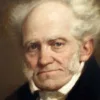Truth that has been merely learned is like an artificial limb, a false tooth, a waxen nose; at best, like a nose made out of another’s flesh; it adheres to us only because it is put on. But truth acquired by thinking of our own is like a natural limb; it alone really belongs to us. This is the fundamental difference between the thinker and the mere man of learning.
[Hingegen klebt die bloß erlernte Wahrheit uns nur an, wie ein angeseßtes Glied, ein falscher Zahn, eine wächserne Nase, oder höchstens wie eine rhinoplastische aus fremdem Fleische. Die durch eigenes Denken erworbene Wahrheit aber gleicht dem natürlichen Gliede: fie allein gehört uns wirklich an. Darauf beruht der Unterschied zwischen dem Denker und dem bloßen Gelehrten.]Arthur Schopenhauer (1788-1860) German philosopher
Parerga and Paralipomena, Vol. 2, ch. 22 “On Thinking for Oneself [Selbstdenken],” § 260 (1851) [tr. Saunders (1890)]
(Source)
Source (German). Alternate translations:Truth that has been merely learned adheres to us like an artificial limb, a false tooth, a waxen nose, or at best like one made out of another's flesh; truth which is acquired by thinking for oneself is like a natural member: it alone really belongs to us. Here we touch upon the difference between the thinking man and the mere man of learning.
[tr. Dircks (1897)]Truth that has merely been learnt adheres to us only as an artificial limb, a false tooth, a was nose does, or at most like transplanted skin; but a truth won by thinking for ourself is like a natural limb: it alone really belongs to us. This is what determines the difference between a thinker and a mere scholar.
[tr. Hollingdale (1970)]... other hand, the truth acquired through our own thinking is like the natural limb; it alone really belongs to us. On this rests the distinction between the thinker and the mere scholar.
[tr. Payne (1974)]
Quotations about:
memorization
Note not all quotations have been tagged, so Search may find additional quotes on this topic.
I agree as to the doubtful value of competitive examination. The qualities which you really want, viz., self-control, self-reliance, habits of accurate thought, integrity and what you generally call trustworthiness, are not decided by competitive examination, which test little else than the memory.
Florence Nightingale (1820-1910) English social reformer, statistician, founder of modern nursing
Letter to Lord Edward Geoffrey Stanley (17 May 1857)
(Source)
Regarding selection processes for military officers. This was undergoing reform during the period, including the radical proposal to prevent people from buying their way into lower officer ranks.
We readily inquire, “Does he know Greek or Latin?” “Can he write poetry and prose?” But what matters most is what we put last: “Has he become better and wiser?” We ought to find out not who understands most but who understands best. We work merely to fill the memory, leaving the understanding and the sense of right and wrong empty.
[Nous enquerons volontiers, Sçait-il du Grec ou du Latin ? escrit-il en vers ou en prose ? mais, s’il est devenu meilleur ou plus advisé, c’estoit le principal, & c’est ce qui demeure derriere. Il falloit s’enquerir qui est mieux sçavant, non qui est plus sçavant. Nous ne travaillons qu’à remplir la memoire, & laissons l’entendement & la conscience vuide.]
Michel de Montaigne (1533-1592) French essayist
Essay (1572-1578), “Of Pedantry [Du pedantisme]), Essays, Book 1, ch. 24 (1.24) (1595) [tr. Screech (1987), ch. 25]
(Source)
This chapter was present in the 1580 edition, and was expanded in succeeding ones. In the case of this passage, the words "and the sense of right and wrong" were added in the 1595 ed.
The 1595 ed. and beyond labeled this as ch. 24; the 1588 ed. used ch. 25. Different translators may vary.
(Source (French)). Alternate translations:We are ever ready to aske, Hath he any skill in the Greeke and Latine tongue? can he write well? doth hee write in prose or verse? But whether hee bee growne better or wiser, which should bee the chiefest of his drift, that is never spoken of, we should rather enquire who is better wise, then who is more wise. We labour, and toyle, and plod to fill the memorie, and leave both understanding and conscience emptie.
[tr. Florio (1603), ch. 24]Men are ready to ask, does he understand Greek or Latin? Is he a poet or prose writer? But whether he is the better or more discreet man, though it is the main question, is the last; for the inquiry should be, who has the best learning, not who has the most.
We only take pains to stuff the memory, and leave the understanding and conscience quite unfurnished. [tr. Cotton (1686), ch. 24]Men are apt presently to inquire, does such a one understand Greek or Latin? Is he a poet? or does he write in prose? But whether he be grown better or more discreet, which are qualities of principal concern, these are never thought of. We should rather examine, who is better learned, than who is more learned.
We only labor to stuff the memory, and leave the conscience and the understanding unfurnished and void.
[tr. Cotton/Hazlitt (1877), ch. 24]Men are apt to inquire, "Does such a one undersdtand Greek and Latin? Is he a poet, or does he write prose?" But the main point, whether he be better or more discreet, we inquire into the lastd. The question should be, Who is the better learned? rather than, Who is the more learned?
We labor and plot to stuff the memory8 and in the meantime leave the conscience and the understanding empty.
[tr. Rector (1899)]We readily ask ourselves: "Does he know Greek or Latin? Does he write in verse or in prose?" but whether he has become better or more thoughtful -- that is the principal thing, and that is left in the background. The enquiry should be, who is best learned, not who is most learned. We labour only to fill the memory, and we leave the understanding and the conscience empty.
[tr. Ives (1925), ch. 25]We are eager to inquire: “Does he know Greek or Latin? Does he write in verse or in prose?” But whether he has become better or wiser, which would be the main thing, that is left out. We should have asked who is better learned, not who is more learned.
We labor only to fill our memory, and leave the understanding and the conscience empty.
[tr. Frame (1943), ch. 25]
I gladly come back to the theme of the absurdity of our education: its end has not been to make us good and wise but learned. And it has succeeded. It has not taught us to seek virtue and to embrace wisdom: it has impressed upon us their derivation and their etymology. We know how to decline the Latin word for virtue: we do not know how to love virtue. Though we do not know what wisdom is in practice or from experience we do know the jargon off by heart.
Michel de Montaigne (1533-1592) French essayist
The Complete Essays, II:17 “On Presumption” [tr. Screech (1987)]
(Source)
Those masters who allege the incapacity of tender years, only tacitly reproach their own: those who are incapable of teaching young minds to reason, pretend that it is impossible. The truth is they are fonder of making their pupils talk well than think well; and much the greater number are better qualified to give praise to a ready memory than a sound judgment.
Oliver Goldsmith (1730-1774) Irish poet, playwright, novelist
The History of England; in a Series of Letters from a Nobleman to His Son, Letter 1 (1764)
(Source)
Anyone who in discussion relies upon authority uses, not his understanding, but his memory.
An education isn’t how much you have committed to memory, or even how much you know. It’s being able to differentiate between what you do know and what you don’t. It’s knowing where to go to find out what you need to know, and it’s knowing how to use the information once you get it.
William Feather (1889-1981) American publisher, author
(Attributed)
The original source for this has not been found. It is quoted (without source) in Carman Fish, "The Safety Valve" column, National Safety News (1960-01). Prior to that, it is also quoted in Telephony Magazine, Vol. 150 (1956), p. 23 (but that article itself notes it is quoting from an issue of Copperweld Magazine).
The first two sentences are often credited to Anatole France, but this seems to be a fairly recent (1990s?) misattribution.
Another variant (attributed to France, uncited; e.g.): "True education is the ability to discern the difference between what you do know and what you don't."






